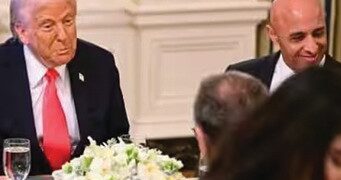March 26, 2021

The senior-most American dealing with Iran policy in the Biden Administration says he’s mystified as to why the Islamic Republic keeps sending its proxies in Iraq to attack Americans there, saying it just makes it much harder for the Biden Administration to build support for returning to the nuclear agreement.
US troops and bases in Iraq have come under rocket attack several times since Biden took office, causing multiple casualties, including the death of a non-American civilian contractor and the wounding of a US military service member.
US forces responded to the first of the attacks, on an airbase housing US troops in the Kurdish city of Erbil February 16, by striking Iran-backed militants in eastern Syria nine days later. Politico cited unnamed US defense officials as saying they suspected an Iranian proxy militia also was responsible for a March 3 rocket attack on western Iraq’s Al-Asad airbase, which also houses American forces.
In a March 17 interview with VOA Persian, US Special Envoy for Iran Robert Malley was asked whether he thought the attacks were part of an Iranian campaign to pressure President Joe Biden into easing sanctions imposed on Tehran.
“It’s not really helping the climate in the US to have Iranian allies take shots at Americans in Iraq or elsewhere, and the US will respond as it has responded and it will continue to respond,” Malley said.
Malley reiterated the administration’s desire for talks with Iran about returning the US to compliance with the JCPOA if Iran does the same. He said recent actions by Iran and its proxies are not helping. “If … these are [Iranian] tactics aimed at speeding things up, it’s hard to see how that is going to work,” Malley said.
In a separate interview with BBC Persian the same day, Malley said that if Iran does not want to enter into direct talks with the US, the two sides could negotiate through a third party, which is a proposal already made by the Europeans.
Iranian Foreign Minister Mohammad Javad Zarif, in an interview with Politico published the same day, warned that if Washington continues to demand that Tehran make the first move, Iran will take unspecified “new steps” away from the nuclear deal.
The Biden Administration has said any US return to the JCPOA would be followed by negotiations aimed at strengthening the nuclear deal to resolve US concerns about Iran’s other activities, including its missile program and support for Islamist militants engaged in long-running conflicts with the US and its regional allies. US officials have not specified how they would persuade Iran to make concessions in any such negotiations given that the US would already have given up its main leverage by ending sanctions.
“The JCPOA has shown that it is fragile, and we believe it can be strengthened with a follow-on deal. And we will press Iran and try to convince Iran that it’s in their interest as well to get a follow-on deal,” Malley said. “Of course, Iran will have issues that it will want to bring to the table,” he acknowledged.
Zarif, speaking to Politico, said Iran would consider discussing nonnuclear issues if the US “passes the test” of JCPOA compliance.
“But the United States miserably failed, not only during the Trump Administration but even during the past two months of the Biden administration,” he said.
Zarif expressed doubt that the US would be prepared to discuss issues such as US arms sales to Iran’s regional rivals.
“Are the US and its Western allies prepared to stop that? That’s a very lucrative market and I don’t think President Biden wants to do that,” Zarif said.
In January, however, the Biden Administration announced a freeze on Trump-approved US arms sales to Saudi Arabia and a review of those the former president approved for the United Arab Emirates.
US officials told national media that the arms sales reviews were not unusual for a new administration and said many of the transactions are likely to go forward eventually.























